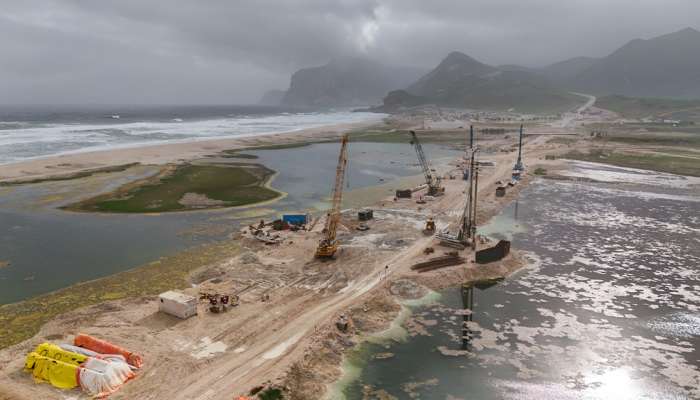
Muscat: In a major breakthrough, over OMR30 million worth savings have been made in the allotment of tenders in Oman's government projects sector during 2024 and the first half of the current year (2025).
According to the Projects, Tenders and Local Content Authority, the significant improvements has led to a substantial 43 percent reduction in estimated tender costs and expenditures.
The issuance of tenders demonstrated notable growth, reaching 100 tenders during 2024 with an additional 26 tenders released in the first half of 2025, reflecting strengthened advance planning capabilities and accelerated project implementation timelines.
Change order management showed considerable improvement with a 24 percent reduction, indicating advanced project monitoring mechanisms and technical oversight effectiveness.
Eng. Badr bin Salim Al Maamari, Chairman of the Projects, Tenders and Local Content Authority, emphasised that these outcomes demonstrate Oman's strategic commitment to realizing "Oman Vision 2040" objectives through optimised public expenditure and enhanced governance standards in government project management.
"The reduction in tender estimated costs and substantial financial savings across government projects and procurement activities represent the successful implementation of project governance frameworks, cost control measures, updated regulatory bylaws, and document cycle management," stated Al Maamari.
He highlighted that coordinated integration among various government entities has been instrumental in achieving optimal resource utilization and maximising value from public expenditure.
He further noted that the Authority maintains steady progress in developing comprehensive government project and contract management systems while implementing international best practices.
"Our commitment to transparency and operational efficiency is demonstrated through electronic platform deployment for tender management and government project implementation, significantly enhancing performance metrics and accelerating developmental project execution that directly impacts both society and national economic growth," he added.
Al Maamari affirmed that these initiatives embody core principles of governance, sustainability, and institutional integration, reinforcing Oman's comprehensive approach to sustainable development while strengthening its position as an attractive investment destination and regional center of excellence in government project management.
Eng. Said bin Hamad Al Amri, Director General of Tenders at the Projects, Tenders and Local Content Authority, reported a 13 percent increase in awarded tender volume during the previous year (2024) compared to 2023 figures, while the total award value decreased by 12.6 percent to OMR786.6 million. Change orders showed significant improvement, declining to 54 instances in 2024 compared to 71 recorded in 2023.
"The Authority achieved financial savings exceeding OMR15 million through tender optimization and an additional OMR6 million through enhanced project governance and advanced technical methodologies in contract evaluation and implementation," Al Amri stated.
These results demonstrate the success of ongoing expenditure rationalization, cost control measures, and continuous improvement in government project awarding and execution mechanisms.
Regarding government procurement, the Director General reported additional savings of OMR5.7 million during the first half of the current year (2025) through strategic initiatives including Microsoft educational license procurement and renewal for government educational institutions, alongside student desk supply and installation projects for Ministry of Education’s schools.
Previous year (2024) achievements included OMR3.9 million in procurement savings through multiple initiatives: replacement of aging air conditioning systems in Ministry of Education’s schools (phases three and four), Sultan Qaboos University (SQU) student transportation services, framework contracts for textbook printing, university student housing provisions, computer supply for information technology curriculum implementation in primary schools, upgrades to the "Esnad" electronic tendering system, and operation and maintenance contract renewals.
Al Amri added that the Authority has established comprehensive government project management governance through collaborative engagement with relevant stakeholders, developing an integrated database for ongoing projects that tracks key performance indicators including cost, schedule, and quality metrics.
This initiative has enabled early identification of project challenges, empowered specialized teams to implement proactive corrective measures, and enhanced development budget performance monitoring.
He pointed out that through Adaa, the official government platform for Projects Management, the Authority maintains continuous monitoring and updating of project technical and financial data, ensuring information accuracy while providing analytical dashboards for ongoing project performance evaluation. This system enables identification of sector-specific challenges and opportunities, supports new project assessment and planning, facilitates precise schedule management and monitoring, ensures implementation quality standards, and promotes rapid adaptation to project changes – collectively ensuring optimal resource utilization and targeted developmental impact achievement.
Eng. Abdullah bin Humaid Al Habsi, Head of the Projects Follow-up Office at the Projects, Tenders and Local Content Authority, reported that the Authority has conducted comprehensive procedural reviews of government project implementation frameworks in collaboration with multiple government entities and private sector representatives.
This re-engineering initiative aims to enhance project management efficiency while elevating governance and transparency standards.
He added that over recent periods, the Authority has conducted more than 25 specialized workshops and technical meetings addressing development project governance and regulatory frameworks, emphasising the critical importance of detailed project implementation plans prior to tender issuance, coordinated with development budget management and project implementation entities.
He affirmed that these collaborative efforts have successfully streamlined documentation cycles, standardised procedures, automated data processes and workflow steps, and elevated governance standards through precise responsibility definition and enhanced transparency throughout all project implementation phases.
He pointed out that the newly implemented cycle is projected to significantly reduce tender floating and contracting timeframes while accelerating government project execution with improved efficiency, enhancing Oman's capacity to achieve developmental objectives within established timelines and allocated resources.
The Head of the Projects Follow-up Office confirmed that these systematic improvements form part of a comprehensive vision for government operational system development, enabling entities to implement projects according to international standards while achieving economic efficiency and sustainable public fund utilization.